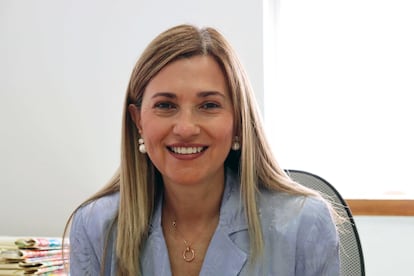World’s top myeloma researcher: ‘We’re talking about curing blood cancer, unthinkable 20 years ago’
María Victoria Mateos, a doctor from Salamanca in Spain, recently received an international award in Los Angeles for a career devoted to the study of this disease


The world’s leading researcher of treatments and cures for myeloma, a blood cancer, resides in the Spanish region of Castilla y León. Dr. María Victoria Mateos, 52, of the University of Salamanca Healthcare Center, has won the 2022 International Myeloma Society’s Bart Barlogie Clinical Investigator Award, which she acceted at the group’s annual meeting in Los Angeles, California in late August. Mateos is also the president of the Spanish Society of Hematology and Hemotherapy, and she directs innovative therapies at the Salamanca hospital.
Still overwhelmed by the recent honor, the physician insists on having the hospital team and its patient care service recognized, and underscores that it is “the Spanish group’s work” that has received the international accolade.
Mateos explains that myeloma, the condition that she has studied since 2000, when she was completing her training and preparing her PhD, is a blood cancer and the second most common hematological disease after lymphoma. Myeloma is now being treated successfully as a result of advances that Mateos is proud of: “Some 20 years ago, there was hardly any treatment, and within a short time [the disease] was inevitably fatal; in the last few years, we have been able to learn about the disease and discover new drugs.” The doctor says these pharmaceutical advances have been paired with the findings of the Spanish research group in which she participates to create “novel and beneficial combinations for patients; we are talking realistically about curing myeloma patients, which was impossible [not so long] ago.”
We are seeing older patients, so we appreciate that what we are doing is valuable: we are offering quality of life and quantity of life
Mateos explains that after she enrolled in Salamanca’s medical school, she studied and specialized in hematology before starting her thesis on myeloma. As she was learning about the disease and writing her dissertation, laboratories discovered useful drugs for treating the disease and conducted trials that allowed her to carry out the “clinical research” on which she has based her subsequent professional development and healthcare work.
Mateos emphasizes that this progress has resulted in more patients being diagnosed with myeloma. She now sees many people in her practice who were diagnosed with the condition some time back, evidencing that they have managed to fight the disease for much longer than they could have not too long ago. “We are seeing older patients, so we appreciate that what we are doing is valuable: we are offering quality of life and quantity of life,” she says. Mateos praises the new immunotherapy strategies and innovative treatments that act against tumor cells, and which “are very well tolerated” by patients.
Myeloma has a “constant incidence” of about four cases per 100,000 inhabitants each year, and about 2,000 cases are detected annually, Mateos says. Early diagnosis makes it possible to detect “emerging premalignant situations.” These routine tests are essential to tackling this cancer and getting the patients into a monitoring program to guarantee that they will receive good care. Mateos points out that developing effective treatments requires additional funding, and she calls on the private sector to get involved through philanthropy: “The International Myeloma Society has an American foundation that donates millions of euros a year to research grants.”
Mateos says that the main challenge the healthcare sector faces is the “delay” between when drugs are discovered and when they reach patients. She admits that the pandemic has slowed these processes down, but now that the coronavirus has subsided, she advocates speeding up the procedures that will benefit thousands of patients.
The doctor avers that her award should also acknowledge equality in women’s access to research. “We often have to urge other women to do research and not put it on the back burner. It’s a worthwhile sacrifice, and women can produce a lot of knowledge.”
Tu suscripción se está usando en otro dispositivo
¿Quieres añadir otro usuario a tu suscripción?
Si continúas leyendo en este dispositivo, no se podrá leer en el otro.
FlechaTu suscripción se está usando en otro dispositivo y solo puedes acceder a EL PAÍS desde un dispositivo a la vez.
Si quieres compartir tu cuenta, cambia tu suscripción a la modalidad Premium, así podrás añadir otro usuario. Cada uno accederá con su propia cuenta de email, lo que os permitirá personalizar vuestra experiencia en EL PAÍS.
¿Tienes una suscripción de empresa? Accede aquí para contratar más cuentas.
En el caso de no saber quién está usando tu cuenta, te recomendamos cambiar tu contraseña aquí.
Si decides continuar compartiendo tu cuenta, este mensaje se mostrará en tu dispositivo y en el de la otra persona que está usando tu cuenta de forma indefinida, afectando a tu experiencia de lectura. Puedes consultar aquí los términos y condiciones de la suscripción digital.








































